Text
Men-O-Pause, Think, Feel And Act
“This is not our subject,” said a fifty-plus husband when I reminded him to attend a Talk on Menopause and how it affects women’s physical and mental health.
“Oh really? Is it because they are no more attractive sex objects?” I thought to myself. “When did men become so nirvana about the female body?” I wondered. I have been always used to knowing legit and illegitimate male interest in female bodies. Right from the age of 5 through to their late forties, provided a woman retains her curves up till then, men show so much interest in their anatomy. Society is also so concerned about a woman’s reproductive capacity and performance. It attracts a lot of value as long as it gives hope of conceiving and reproducing a man’s offspring, especially a son. Married women are so pressurised for bearing and nurturing dynasty movers and shakers.
“Now that the reproductive organs of your wife have already served you, it is struck off your list of ‘subjects’ right?” the bitch in me wanted to quip.
The notification for the online Talk by a practising gynaecologist was also posted on social groups with more male members. The Speaker wanted men to attend it in large numbers. She wanted them to know and understand what happens to a woman's body and mind before, during and after menopause. She said it would help them provide the necessary support to their female relatives, friends or colleagues going through this biological phase. Yet there was hardly any man attending it. While starting the programme as the anchor, I saw some men joining the online platform. But soon I realised they were logging into their account for their non-tech savvy wives to attend. Because soon after joining, they disappeared from the camera and the vicinity. Their wives came in. The husband who said it was not a man’s subject, stated it, albeit unknowingly, on behalf of most of the men. It revealed their ignorance and apathy about this female biological phenomenon. As far as I could recall, I have heard men only cracking misogynist PJs on menopausal dry vaginas. Even women have a negative outlook on this. Many would remember how a young Bollywood actress made a controversial comment on a famous female sixty-plus author as a ‘fossil’...’ going through menopause.’ I have hardly heard or seen men treating menopausal women with love, wisdom and compassion. Except for a rare few.
The Indian masses anyways have limited and distorted knowledge of the reproductive system. Both men and women are ill-informed about their biological processes. Moreover, female reproductive systems such as menstruation and menopause are mired in deep-rooted superstitions, prejudices, myths and mental blocks. Even women, including the educated ones, are often found not knowing much about these systems, especially about menopause.
I find social conditioning also plays behind the lack of interest to know and understand menopause and how it affects a woman. Since it is the cessation of a woman’s reproductive ability, no one takes interest in it anymore. Somewhere deep down a woman’s worth is measured by her reproductive capacity, among other parameters. I find men's apathy in menopausal women so contradictory to their otherwise high level of interest and curiosity for the female body. As long as they are interested in the female body, they research and study it a lot for the purpose. They would look up all resources of information about it, often inauthentic though. By the time their wives reach menopausal age, they have already grown indifferent. They have ebbing sexual interest in their wives bodies due to familiarity-bred boredom. It is common in a monogamous relationship. So, women are often left alone to deal with the bothersome symptoms of menopause. Like any other physical pain and biological hassles, they have to go through its effects on their physiology and psychology, alone. Unexplainable pains and aches, uneasiness, discomfort, panic attacks, hot flashes, disturbed sleep, mood swings, depression, anger, irritability, lack of stamina and emotional outbursts, all go ununderstood. It becomes especially difficult as women often suffer from empty nest syndrome at the same time. The male partners and relatives are not able to empathise. If the women stay at home, do not do much, lack purpose, and are alone, the symptoms bother them even more. In such situations, their husbands have a big responsibility to look after them with care and compassion. It wouldn’t be possible if they believe it is not their subject.
#menopause#female body image#patriarchy#misogyny#female health#reproductive health#objectificationofwomen
1 note
·
View note
Text
2020 - The Year of Journey to the Centre of the ‘Self’
It Started With The Most Frequently Asked Corona Pandemic Question:
“When would we be able to go back to our old days?”

Image courtesy
It was one of the quiet evenings in 2020. The Lockdown was in full swing. The roads were completely deserted except a few stray street dogs roaming around or resting. There was an eerie silence all around. A jeep with its headlights on appeared at the end of the street in front of our house. It was moving slowly. Soon an announcement on the loudspeaker broke the silence in the area. The local Councilor was cautioning people from venturing out unnecessarily and crowding the market during the few hours of their operations. He was assuring people, trying to assuage their anxiety that soon we would be able to return to our ‘old, normal days’ if we diligently follow the preventive measures.
“When would we be able to go back to our old days?”
This was the most frequently asked question throughout the pandemic year of 2020.
People said the same thing in affirmative as a solace, like the Councilor was announcing.
“Few more days, once the vaccine comes, we would go back to our old days;”
I think they meant our old ways.
“Going back to our old ways or days’, these words made me wonder if it would be the best thing to do. Does this pandemic have no other purpose except disrupting our status quo temporarily? Isn’t the virus hinting us to review and reflect on our old ways of living? Was everything ‘normal’ in our Covid19 pre-pandemic world?
I think such introspective queries jolt us from our pride and complacency. We sit up and realize how vulnerable we are. It forces us to revisit how we were going about on this beautiful planet called Earth thus far? It makes us look within, in our deeper levels of consciousness to check how authentic we are in our being. We question ourselves about what we made out of our time and privileges to contribute meaningfully to our world.
For me, when my external life came to a screeching halt during the Lockdown, I set out on a journey within, to the center of my own ‘Self’. I think life comes full circle in the knowledge of the true ‘Self’.
The work is in progress:
1) Exercise
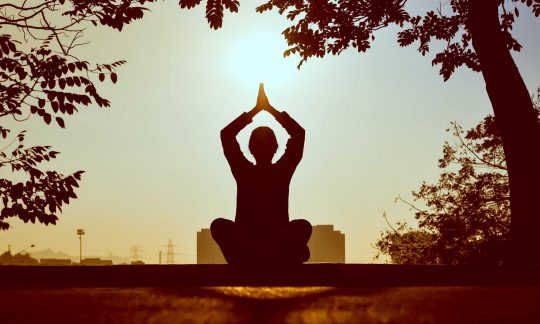
Image courtesy
2) Meditation

Image courtesy
3) Reading

Image courtesy
4) Writing journal

Image courtesy
5) Listening to Podcasts/Talks
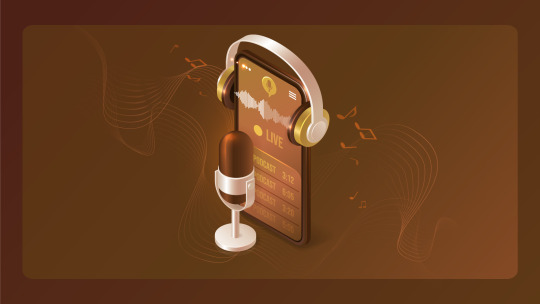
Image courtesy
6) Coaching people - Deep listening to people, their worries, hopes, dreams and concerns
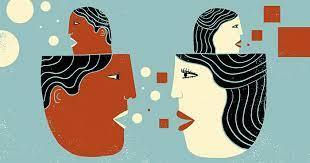
Image courtesy
#yoga#meditation#journalwriting#fitness#mentalhealth#listeningskill#deeplistening#lifecoaching#podcast#eckharttolle
0 notes
Text
The Windows to Look Within Open The Door To Self-Discovery
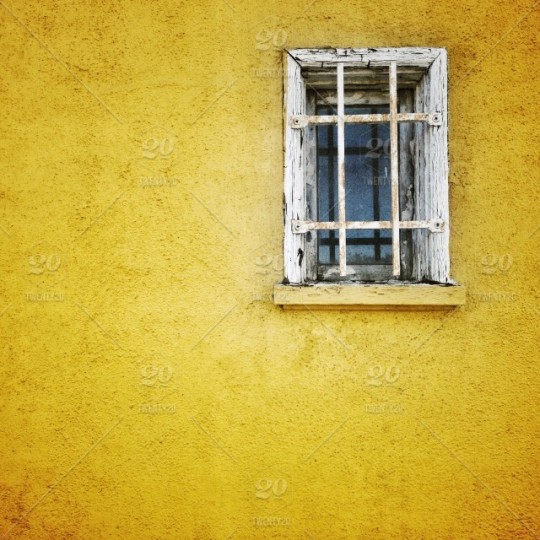
Image Courtesy
If Cellular phone and Internet services die tomorrow, will I die too?
No, I won’t. I lived more than 3 decades of my fifty plus life, in an era without mobile phones and the internet.
What if I face a situation where mobile phones and the internet are strange new essentials? What if I am asked to forget or unlearn everything overnight to live with these technologies?
This is exactly what happened to me, which was no less than a fictional situation for me. The change was not only happening in the external world. My personal and inner world also started to transform at the same time.
4th JOHARI Window - The Unknown Self
At a fictional level I can imagine a world where climate change has brought the ice-age back. Or, maybe I am kidnapped and dropped on an unidentified, uninhabited island in the pacific ocean. How about living in an Amazonian tribal community with a completely new identity? Or, it could be a world outside the earth, on an alien planet or under the ocean. How I face such a scenario would almost resemble a Hollywood blockbuster script. Besides, it would most likely reveal the 4th JOHARI Window pane called the ‘Unknown’ in me. It is a part of you thus far unknown to yourself and to others.

Image courtesy
Life throws us in situations beyond our familiar patterns of expectations. Death of a close family member, a terminal disease or divorce often catch us unprepared and unaware. Our entire range of perspectives change radically. We face unthought-of challenges.
Among these three situations, when the third happened to me, I was not only thrown out of gear from my comfort zone. I was facing a new era where the digital economy had stepped in in India. I was from a pen and paper generation. I faced the challenge of learning computers to get a job in the booming IT sector. I needed it urgently to sustain myself and my children. I began using a mobile phone also for the first time these days. I found myself in a new home, starting from scratch. My marital status changed from married to single. I also became a single mother with two millennials under my wings. My economic position changed from a homemaker to a professional. The external changes reflected my inner awakening as a woman. I was trying to break free of patriarchy and its crippling conditioning.
The Three Other JOHARI Windows
A situation like this opens up all the other three JOHARI windows of a person. These are known as Open Self, Blind Self and Hidden Self. True self-awareness sets in when you study your personality through these Windows.
I discovered my Blind Self to see the courage and resilience in me to deal with the situation. I became conscious of my HIdden Self, my vulnerabilities, habits only I was aware of.

Image courtesy
Would you like to check your JOHARI Windows and discover yourself in a new light? Click here.
#johari window#self-awareness#self-discovery#self-care#self-worth#communication#peoplemanagement#psychology#mindreading#selfimage#selfassessment
0 notes
Text
Ek Chutki Sindoor - A Badge of Honour or a Mark of Subservience?

Image courtesy
“How on earth am I supposed to know about your marital status? You don’t have sindoor on your hair parting,” the Director of a renowned management studies institution howled at me.
I was at his office to submit an application.
Being married at the time of doing the PG Diploma course at his institution, I used my now ex-husband's surname, different from my maiden one. The administration wanted an application along with an affidavit, confirming my identity.
The short-tempered, middle-aged man glanced at the documents before signing. He demanded to know why I was not wearing a sindoor on my forehead if I was married. The defiant bitch raised its head in me. I chose not to give any explanation in reply to his question. Instead, I dared to ask him, “Sir, how do I know if you are married? I can’t see you wearing any signs of marriage on your person.”
The next moment I found myself picking up my papers strewn all over the floor of his office. He flung my file in a rage and shouted, “Get out of my office”!
The absence of ek chutki sindoor on my forehead caused me to experience this identity crisis several times.
People found it difficult to gauge my marital status without that red marking despite the affidavits, I kept making all my life assuring them who I am.
Women in my circle tried to cajole me into wearing it. They cited its benefits and necessity for my dear husband’s general well-being. They said it would keep Yamraj, the God of death, at bay from taking his life untimely. Yet all these couldn't convince me to do it. I ignored their advice.
The hidden significance of sindoor
A Hindu wedding ceremony reaches its finale when the bridegroom puts a pinch of vermillion on the bride’s hair parting. It is the hallmark of matrimony for a Hindu woman. It solemnises the sacred marital contract with a much-delayed expiry date. Hindu marriages supposedly have a prolonged shelf life of over 7 lifetimes. The red mark notifies the proprietorship of a man and his family on this woman from that point onward in her life. This material entitles the man to have sex with her on the first night of marriage despite being a stranger to her. It gives him the right to do so with or without her consent or comfort level. The pinch of vermillion empowers the in-laws to have complete authority and control over her life. They can now judge her for everything, from her upbringing, family background to her character and habits.
The cultural illusions
Still, this is the moment in a Hindu Indian wedding ceremony when all the women among the guests, witnessing the spectacle, go mushy in their hearts. One can hear them coochie-cooing about how romantic it is. They believe it instantly enhances a woman’s beauty a few notches up. People are amazed at the power of this stamp of patriarchy. It promotes a girl to the honourable and safe societal pedestal of a “married woman" overnight. Women apply it every day to reiterate their love, respect, sense of belongingness and commitment to their husbands.
Women’s belief in the divine power of protecting their husbands also incentivises their well-being. The label of ‘widow’ or ‘spinster’ comes with many stigmas and existential struggles. Widowhood also indicates the cessation of many social sanctions and status in conservative societies. No wonder women are afraid of being widows.
The fear-based culture, thus, indents another fear in a woman’s mind. It makes her obey this patriarchal indoctrination.
Besides Sindoor, many other ornamental items occupy various parts of a woman’s body, from head to toe, to barcode her as married. It is also believed that wearing these ornaments stimulates the sensuality and fertility of women as if the natural physiological system was not self-sufficient to ensure these body functions.
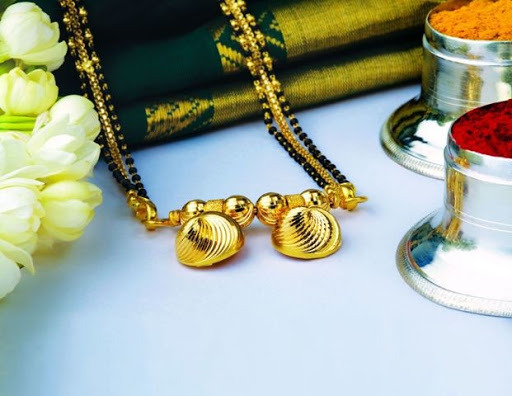
Image courtesy
My awakening
I, too, was not an exception to this. But, my inner voice gained strength over the experience of divorce and a second marriage. It is now clear to me that these are nothing but patriarchal conditions. If I use these items in my makeup, I know why I am doing it.
A woman may face social backlash and identity crisis as I did in my life for not wearing sindoor and other marital symbols. In some incidences, the husbands even filed for divorce for this reason.
The entire system of patriarchy reeks of objectification of women as sexual and reproductive assets of men. The obligatory custom of women wearing marital symbols unilaterally reinforces that.
Unfortunately, women identify their self-worth through such rituals.
In the era of knowledge, women must know the truth behind the tradition of wearing marital symbols. They should make an informed and deliberate choice to wear them. It should not be a fear-based cultural compulsion.
You can read it here too.
#hinduweddingceremony#indianweddingrituals#patriarchy#vermillion#SymbolofMarriage#patriarchalsociety#superstition#misogyny#sexism
0 notes
Text
My Calling
Your calling shows up in your childhood and keeps coming back throughout your life.
Here is how I tried to figure out what is my calling.
Creative expression and power of observing beauty in ordinary things
On a dark, no-moon summer night I reached the lakeside near my home. One of my uncles, a cousin brother to my father, carried me in his lap and took me there for a little outing. The wavy vertical reflection of the streetlights on the water were the first thing to catch my fancy . “Look, how the lights are melting in the water”, I pointed out towards the lake and told my uncle.
I looked around and could not see much in the darkness. I looked up. Though there was no moon, the sky was smog-free, glittering with stars. I raised my little hand towards the sky and pointed at a star, “The sky looks so beautiful. Can you see that star? It is looking like a sparkling dot on the forehead of the sky, like the one mom puts on when she dresses up,” I told my uncle. He noted my ability to express creatively and conveyed the same to my mum after returning home with me. He told her, “Your daughter could be a poet one day.”
That was my very first memory about my spontaneous response as a child towards images and nature. When I reflect on it, I realize my inner self connecting with the present surroundings. I see my ability to observe beauty in mundane things.
Though blunted by the worries of the world, I do notice some sparkles in my musings even today.
Ability to feel oneness with nature, being in the present
I am aware of my natural ability to feel the calming stillness and poignant poise of the universe. The way it cradles the enormous play of contradictory yet complementary forces of life and death, creation and destruction, intrigues me. As a child, I would find myself playing alone with my earthen and brass toy utensils under the shade of a tree. Yet, I did not feel I was alone. The tree, the butterflies and the bees, the sparrows gave me company. I spoke to them. I felt their lively presence and my oneness with them. Now, I realize, I was so much in sync with nature.
After living in the concrete jungle for almost the better half of my life, I still seek oneness. I have not forgotten my relationship with nature – where I come from, where I belong and where I would go back. I do feel it sometimes by looking at the tree outside my window or the indoor plant in my room.
Ability to feel the pure joy in the positive energy of life
In late-winter afternoons, I insisted to sit outside my home. The local tribal people would come in a flock to sweep the fallen dry leaves. The picture still sticks to my memory. The young tribal women would sweep the spread of crunchy faded leaves into a heap. Their toned bodies would be wrapped in colorful cotton saris. They wore seasonal local flowers in their hair buns behind their ears. They would sing folk songs in a typical aboriginal tune while doing their work. The men would sing along by way of whistling. They would help the women collect the dry leaves and twigs into a heap and then light it up in a fire. I did not understand what they said to each other while doing their work. Now I know the men would crack some jokes or playfully tease the women and they would giggle and quip back. I watched them with so much wonder and amazement. The smoke billowing up from the burnt leaves wafted in the winter-on-retreat breeze. I would feel a mild burning sensation in my eyes and nostrils. I would still sit there and not respond to my mother calling me out to return home. I would sit there as if as a spectator of the eternal drama of life playing out on the earth. I perceived the whole scenario through all my senses as it was. I keenly watched everything. I felt a pure joy – not induced by any purpose or plan. I stayed there as a part of the scene, without any thoughts or emotions shadowing my sense of being. In retrospect that was the ‘self’, the consciousness as an objective observer. It is present in all. It is independent of concepts, perspective and perceptions.
As we grow, we lose the ability to feel pure joy and happiness inherent in our being.
I don’t think as an adult I could retain the ability to tap in that ability. I am again in search of it. At least I am aware of where my happiness lies.
You may have more than one calling and develop one or each of them into a successful career or business.
My innate attraction to handicraft, writing, storytelling
Gradually, I discovered my innate attraction towards handcrafted products. I grew up in a home full of such items. They appealed to my inherent sense of aesthetics. They ignited my imagination with curiosity and care.
I liked my mother's walnut jewellery box with Kashmiri floral curving on it. The lacquered wood, bright red, handprinted powder case on my mother’s dresser attracted me a lot. She bought it from Mysore. My mom loved tuberoses. She would organize a few sticks of it in he grey Bidri long neck metal flower vases with slivery inlay work on it. This was from Hyderabad. It would be kept on a Kashmiri, small teapoy in the drawing-room. There were quite a many items from Kashmir. There was a Kashmiri carved-wood book holder on the bookshelf. The cane center table from Assam sat on a Kashmiri ‘Namda’ rug. I was also very fond of the heavy, metal coin box with Bidri work on it from Aurangabad in my mother’s cupboard. I would keep staring at the set of sherbet glasses in the kitchen cabinet in fluorescent colors. The delicate, transparent, animal figurines in handblown colorful glass, decorated our living room shelves. Those were from Firozabad, Uttar Pradesh. The crocheted tea coasters and the porcelain tea set in the sideboard were so elegant. I loved my mother’s collection of marble and sandstone miniatures. She bought them from Puri, Jabalpur and Agra. Then, I did not know those were handmade by artisans from various parts of my country. Later, as I grew up, I developed a curiosity for the products as well as an affinity with their creators.
For my line of clothes and interior decoration, I preferred handloom and handcrafted products. I developed an interest in the various crafts of India for its heritage and nature friendly values. The human story element in it, its economic value for rural India and last, but not least, its beauty appealed to me. I ended up trying to be a micro-entrepreneur in this sector.
At the same time, I started writing poems. It was around the 7th or 8th year of my life. I co-authored my first poem with my first childhood friend, my namesake too. It was about the current hairstyle of young guys – sort of a comical view on men’s contemporary fashion sense! My second poem was about the moon and the charkha spinning old lady. I would lay flat on my back on the green, slightly prickly grasses of the park behind my home. I would look at the matt white, almost a full moon in the pre-dust, pale blue sky. I read about an old woman who lived in the moon and spun reels of white thread out of heaps of cotton in a fairy tale. I would imagine her working at her spinning wheel while looking at the shadows on that early evening moon.
Since then, I have always been expressing my deeper thoughts and feelings through writing. In my adult life, I worked as a professional writer.
Right from my early teens, I found my enthusiasm in telling stories. I had the ability to observe, visualize, recall, and represent. Few of my school teachers noticed it. They would deploy me to keep the class engaged by telling my fellow students a story. These qualities came in handy when, later in my life, I worked as a feature journalist, a blogger, and a writer.
Ability to think critically and freely
During my late teenage, I often found myself debating with my elders. I raised questions on the social and moral educations they imparted. I questioned many things the established system wanted me to believe. I took part and enjoyed the religious occasions for their festive and family spirit. But I could never develop faith in worshipping deities or following rituals. My spiritual thoughts formed in my mind without any formal knowledge. Initially, it did not have any conscious allegiance to any dogma, or ‘ism’. I never hero-worshipped any individual. Be it celebrities, politicians, spiritual gurus, teachers, or social reformers. Rather, I always wanted to learn from or focus on their work, thoughts, and philosophy.
It helped me in working on various types of feature stories.
Connecting with people through heart
Though I was never an extrovert, right from childhood I felt the natural urge to connect to people on the empathetic ground. It helped me to not develop arrogance and pride; it helped me to remain grounded. It encouraged me to be curious about human psychology and behavioral science. Currently, I have embarked on a new journey as a certified Life Coach. My motivation is to help people in their endeavor to live a better life.. The work challenges my evolution as a better version of myself. It involves dealing with one's own tendencies to be judgmental, biased and egotist. a helping profession of a Life Coach needs self-study.
Courage, conviction, adaptability, zeal to learn new things and resilience in face of challenge
When thrown into challenging situations in life, I found myself wading and surfing through the waves of upheavals. I faced and responded to the demand of the situation. I had my share of slipping off my surfing board. Sometimes I drowned in the turbulent water of adversity. I experienced my and other’s vulnerabilities. I did make mistakes and wrong decisions giving way to more problems. While in my endeavors to make, restore or rebuild things, I ended up breaking a few. I caused hurt to my loved ones, loss and damage to them. It taught me some practical lessons that everyone should know to be more in control of one’s mind, money and matter. At the same time, it taught me to see life in its larger perspective. It taught me to forgive and give everyone, including myself, another chance. It taught me not to lose faith in the innate richness and healing process of life. I got to know the power of human mind. It constantly challenges me to rise above ego and objectively deal with people and situations. It helps me to evolve.
I broke free of my comfort zones. I came out of my marital home, went to court seeking a divorce, raised children as a single parent. I was a homemaker. But I went out, sought and tried different jobs for supporting myself and my family. I did my stints at HR, direct marketing, hotel front desk, home food service, selling saris, IT job till finally I got into my kind of jobs in feature journalism and writing. At every job I learnt new skills, got acquainted with new work culture, came across various types of people. I experienced workplace harassment. Yet I had to deliver what was expected of me. Till the time I got into a writing job, I accepted and tried every other opportunity that came my way. Those were neither my calling nor I wanted to carve a career out of them. I had to do them to meet the urgent needs of my family during the huge financial crisis. There was no option to plan a career, pick and choose. This expanded my horizon of understanding people and situations from different perspectives. I leant to do it without the temptation of judging them. It helps me in my service as a Life Coach.
My energy synergy
I have observed bright, sunny, cool mornings energize me the most. Hope, faith in life-force, urge to work, gratitude peak in my mind during this time. Dusk sees an ebb of energy and agility in me. It feels little depressing during this time. Another day gone from my life, another day closer to my grave makes me feel a bit low at this point. It is very important to spend a productive day. Being present in the present helps to beat the blue a crimson sunset brings in. But post evening I find my mind being able to focus on work again, especially writing. Understanding one’s energy synergy helps in aligning his/her work schedule. It boosts best productivity.
My exploration list
It contains the things I want to do or would do imagining no constraints or limitations stopping me. Such a list also indicates where our calling lies. Though I prefer to keep it to myself, I will share a couple of things from my exploration list here . Travelling tops it. Next is starting a co-creative learning center and a staycation.
1 note
·
View note
Text
Anatomy Of Male Rage In Patriarchy
Has patriarchy really empowered men by legitimizing anger as a trait of manhood? Or has it weakened their emotional maturity? A weakened emotional intelligence is damaging both for them and other members of their families and society at large.
Both men and women are victims of the system. Knowingly or unknowingly either they play the role of a perpetrator or a facilitator of this victimhood.
Let me start with a story
I heard about male rage quite early in my life. I also got to know how women got conditioned to put up with their male partners’ unmanaged anger as a regular part of their lives. My grandmother would tell me this story about a woman named Lakshmi, the wife of one of my grandfather’s residential staff. Lakshmi used to come home and chat with her. Sometimes my grandmother would found her little unmindful or low. She would ask her why. Laxmi would sigh and say in a sad tone that she doubted her husband was not in love with her anymore. She would express her concern that he might be getting into an affair. On a little probing about what made her think so, she would confide to my grandmother that her husband had not been beating her as frequently as he used to. She believed that beating was an extended-expression of marital love and a husband’s right to his wife. It fostered intimacy and trust between them. It maintained the marital equation as it was ideally supposed to be. Often, on the same or later nights, the husband would ‘make love’. Soon another bundle of joy would make its way into the family. Strangely, a grieving woman often arouses lust, and not compassion in some men. They find a sadistic pleasure in forcing sex on their wives even before the hapless women could recover from the pain of physical and emotional abuse. Despite feeling uncomfortable and unwilling, women often get carried away. They mistake it for ‘love’. Even so, sex in such scenarios in the pretence of making up for the violence is often nothing but another way of asserting male dominance over women. This way, they do not want to give women the time and space to heal or ponder over what happened. On some occasions, the encounter amounts to marital rape if the woman shows reluctance or resistance. According to Lakshmi, it was a wife’s duty to put up with the torture and abuse. She believed it would help the man release his stress and pain due to the day-long toil he needed to do for his family. She perceived her husband as a guardian, sort of father figure, a master. According to her, he was entitled to his right to ‘fix’ her by scolding and beating her if she committed any mistake. The mistake could be as trivial as putting less salt in a dish or forgetting to stitch a broken button on his shirt. She also believed having sex with her husband right after the violence was necessary to retain the marriage. Because it is a woman’s only power to keep the man hooked on her and not drift away. Years later I heard the same stories during my fieldwork while doing a course in counselling. The NGOs working for women empowerment in slum areas of the economic capital city of Mumbai shared similar experience. That is how the marital cycle of love lost and found again have been maintained forever in many households.
This is just one example. It shows how the ego-centric power play manifests through the male partner’s rage and what it does to a marital relationship.
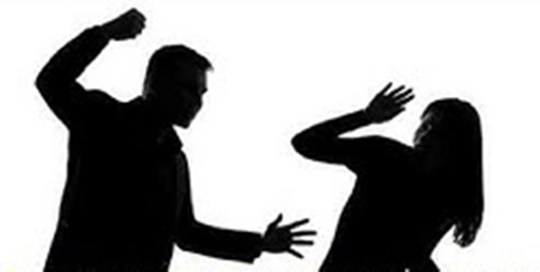
Image courtesy
Tamed elephants, tame others
Lakshmi grew up watching the same cycle of conflict and pacification happening between her parents and other couples. She heard elderly women consoling the anguished younger ones. Those very pieces of advice and worldly wisdom had taken a firm root in her beliefs. She heard them saying that God intended women to maintain balance in their homes and families. If at times it required sacrificing or compromising with their dignity, it was okay. Essentially, women were born to bear the pain to make everyone happy. That is why God entrusted women with a special, sacred capacity to endure sorrow, misfortune and agony. Thus, women were expected to silently put up with their husband’s rage, manipulation, verbal and physical abuse. It helped to retain the marriage and maintain the family’s integrity. The same is expected of women in modern society, even today. Often, women themselves criticize other women revolting against male aggression. They discourage deviating their paths away from this toxic subservience.

Image courtesy
It’s a universally prevalent mindset
My grandmother would casually narrate this tale as a funny story. Later, I realized it was not one Lakshmi’s personal story or an anecdote to laugh at. I observed that this was the cultural conditioning and social status of women from all walks of life. It exposed the flawed and malicious tradition of power-play generally exercised by men in marriage. It is present even in non-marital relationships, patronized by patriarchy.
Almost every time I catch up with my friends, I hear a few of them perpetually complaining about their husbands. These men humiliate and abuse them for no reason or for trivial things. They often speak to their wives using foul language and shout at them at the top of their voices. On some occasions, I saw the derogatory way these men talk to their wives. I heard them nonchalantly making sweeping comments about women in their presence.
At some point in their marital lives, many women endure some or other kind of physical abuse. I and many of my friends and relatives are no exception to this. In some cases, it was spanking and beating, forced sex or forced abortion. I know of cases where in-laws forced a woman to go for the removal of perfectly healthy high canine teeth. Her husband found it ugly. But he was smart enough not to go with the wife to the dentist. Instead, he sent his parents. One of my friends suffered forced non-medical removal of an IUD. Another did not receive any treatment, proper diet and prenatal medical care during her first pregnancy. Some I know were forced to do menial household labour during pregnancy. They had a history of miscarriages. Still, their in-laws and husbands forced them to do excessive household labour. One was subjected to coerced consumption of alcohol. Her husband did this to her to have sex with her against her will. Many of them have been putting up with the humiliating behaviour of their husbands almost throughout their 30 plus years of marital life. They hopelessly hope for change. What amazes me about us women is that even after suffering so much, we temporarily sulk and eventually get back to our tamed status. Women end up accepting and submitting to it as their unchangeable and inevitable fate. The incidences I shared just now are from a so-called upper middle class, urban and educated families. But they almost resemble what happens with countless Lakshmis in less privileged sections of society.
Cultural conditioning
Strangely, these women despite regularly being abused and having been severely ill-treated by their husbands in the past, diligently abide by the marital vows. It starts with revering the ornamental signs of marriage they wear on their person. They unfailingly keep special fasts or perform rituals for their abuser husbands’ well-being and long life. They serve them and sometimes their complicit in-laws in all obeisance and dedication. They feel grateful to them for their evolution from a naïve girl to a woman of the marital household. They keep referring to the ‘good training’ their worldly-wise abusing husbands imparted to them. They feel obliged for the good ‘care’ their abusive, controlling yet ‘responsible’ husbands otherwise provide. The food, shelter, medical care, occasional entertainment and gifts, as if they did not do anything to deserve all that. What amazes me the most is the way these women vouch for their ‘love’ for their husbands though being treated like doormats for decades! I try to gauge how deep the conditioning has been within them. It obliterated the sense of self-care and self-worth in them. It blunted their discretionary power to differentiate between what is a healthy marital relationship based on mutual love, respect and understanding, and what is an ‘arrangement of convenience’. This gives rise to the question are women expected to ‘love’ their husbands by default? Especially in arranged marriages, no matter whether their husbands love them or not? I have seen women being superstitious or defensive if they were asked to question themselves about their unconditional love for their abuser husbands. There could be various reasons for that. One of the main reasons is economic dependence. Staying in an abusive marriage is a far better bargain than being a widow or a divorcee for many women. Hence, women are trained by society, or they train themselves as adults to pay the price by compromising with their self-worth and dignity and stay put. I am no exception. Been there and done that. Although eventually, I did free myself from a long, unsuccessful and abusive marriage, I have experienced my fair share of male rage in the family.
Normalization of male rage under social pressure
I have observed how I rationalized the angry outbursts of the male relatives in my family as the manifestation of their inner unresolved issues. Even after being severely verbally abused, I proceeded with a ‘nothing happened’ façade. Partially, the façade helps in protecting myself emotionally. As they say, no one should have the remote control to manipulate your state of mind. But the other reason for doing so is to avoid or prevent further deterioration of the situation in the family. Hence, to keep the façade of normalcy and balance in relationships and family, we women go on with our daily lives with these abusing men around. We interact with them normally, burying all bruised emotions in the recesses of our hearts. Thus, in so many ways we contribute to the normalization of anger and aggression as an integral part of masculinity. We do not let them realize how damaging it is.
Women do not enjoy the entitlement to get angry, yet not misunderstood
Why am I calling it ‘male rage’?
Let us analyse the ‘genderization’ of rage by patriarchy. It is a common phenomenon that when women lose their composure and get into angry outbursts in certain vulnerable moments, it is not tolerated as in the cases of men. People, including both men and women in the family, criticize and condemn it. They judge and label the angry women. There is no attempt to know and understand the underlying reasons behind it. No one sees it in the totality of the matter, as they do for men. They start characterization of the woman for getting into angry fits. People even start doubting women's mental health, unempathetically though, if they occasionally get angry. In some outlandish cases, they believe it to be the influence of certain supernatural or paranormal elements. Not only that. Later, those angry episodes of women are referred to out of context. The men in the family would do that to justify their own irrational and often deliberated rage. It becomes a counterattack or whataboutery technique.
In the case of men, episodes of anger are often considered as freak incidents under stress and duress caused by certain external factors. The faith in their core goodness is retained by parents and others. Not so for women. This is strange. It shows how convoluted is the belief that anger or aggression is a sign of masculinity. It is perceived as synonymous with power and strength. Simultaneously, blaming men’s anger on some external factors indicates their inherent weakness, incapacity, immaturity or failure to handle difficult emotions, people or situations. This paradox nullifies the concept of power or superiority expressed through their anger.
The hard questions men and women need to ask themselves
Why do women not want the men in their lives and in society to be accountable and responsible for their behaviour? Why should men enjoy the liberty and privilege to let loose their toxic states of mind, anytime, anywhere? Why would they use their lousy anger to hide their messed up emotions, stress, internal pain, confusion or trauma? Why would they choose to unleash their anger on the women closest to them such as their mother, sister, daughter or wife? Is it because these women provide themselves as the safest punching bags with the least propensity to hit back? Is it because women are expected to save the semblance of family honour and peace, at least on the surface, by quietly tolerating and hiding it within the four walls of their homes? Why do we allow men to cross our boundaries and howl at us and utter all sorts of nonsense? Why will the onus be on women to provide men with emotional crutches or a hardened back or both at the cost of their own emotional and physical well-being? Why do women let the men in their families unleash their internal demons upon them? Anyway, the relief men get by doing so remains temporary as the root cause is somewhere else and something else. Things come back to square again. What then is the point of women taking the brunt of male rage upon themselves? Does it help in keeping the peace, love and family bond, unscathed and not sabotaged? When will men, especially the so-called educated breed who manifest so much anger, realize and accept that they need help to fix this problem? When will men take responsibility for their malaise and seek professional help or do anything but spare their wives, mothers, sisters, female relatives or subordinates from it?
Is putting up with male rage an arrangement of convenience?
Let women not fool themselves and hide behind the self-glorification of saving family peace and integrity by putting up with male rage. They need to wake up and acknowledge how deeply they have been conditioned to devalue their role in the family and society. They need to question themselves why do they accept such rage? Is it the pound of flesh they barter against the monetary support provided by their husbands or other male relatives? They need to look into the mirror and see. Do they silently put up with male rage in the marriage to hang on to the marital surname, its perks and privileges and a perceived sense of security that comes with it? There is a saying that nothing comes free. So, is the monetary support received from husbands or any other immediate male family members also not free? Rather, are these considered as ‘favours’? Women’s contribution, their legal rights or men’s socially defined duties towards them, nothing matters? A woman’s role and contribution in the family and society as a mother, wife, daughter or sister has been deemed economically void. There is no statutory system of monetary reimbursement for their services in the family. Whatever economic support they receive from the males in the family is thus projected as a favour and not a return they deserve. On top of that are women supposed to reimburse these ‘favours’ by conforming to patriarchal expectations? Upon failing in that area too, are they supposed to compromise with their self-care and accept such abuses in the form of men’s angry outbursts? Are they also expected to own up to the guilt of causing it? Then, should women play any victim card? As in that case, wouldn’t it be women who choose this predicament for themselves? In the process, directly or indirectly, aren't they facilitating patriarchy to spoil the human capacity of compassion, empathy and better emotional maturity in men? Isn’t it high time that society and women themselves unlearn to devalue their roles? Or else, shouldn’t they make economic independence a priority over and above everything else? At the end of the day, isn't money a big and powerful differentiating component in human life? Surprisingly, I have seen even economically independent women putting up with male aggression and abuse. Why? Some of them told me that they did so to retain the ‘image’ society wanted women to have. Some of them are crippled by the fear of what people would say if they take any step to free themselves out of this trap? They are wary of how that would impact their children’s lives? But is it worth it? Isn’t life too big and too precious for this delusional ‘image’ women are fooled into conforming to by society and culture? Isn’t this ‘image’ a sort of blackmailing tactic by patriarchy? Because if a woman loses it or defies it, society makes her life miserable at every step.

Image courtesy
Faulty attribution of human traits by patriarchy
Endurance, composure, gentleness, and forgiveness are considered integral qualities of being feminine. But anger, temper tantrums, violence, and rage have been defined as signs of masculinity or power. Both are constructs of patriarchy and both women and men are victims of it.
As a woman, I have heard innumerable times that I should not get angry, raise my voice, say harsh things or use cuss words. Not because these are not the right way to deal with my emotions triggered by someone or something. But because it is unbecoming of women to behave like that. They must always be soft-spoken, shy, understanding and tolerant. Whenever I slipped from this paradigm, I was criticized and called names. My grandfather, a great patriarch himself, enjoyed and endorsed my adolescent brother shouting over me in his cracked teenage voice. He said, “He is a man. He is supposed to roar like a lion. You cannot equal him as you are a woman, you do not even have a strong voice like him.” In reality, none of these traits is gender-specific. Though it is believed from an evolutionary perspective that men are genetically more prone to aggression, violence and combative tendencies, social psychological theories do corroborate the genderization of this supposedly genetic tendency which is misused as a power tool in patriarchy.
Be it aggression or compassion, both are behavioural characteristics of human emotions. It is found both in men and women. In some cases, a role reversal also happens. In such cases, the women resort to anger, temper tantrums, undue domination, manipulation and rage as a defense, offence or simply a power-exerting tool. Thus they camouflage their vulnerabilities, while the husbands or the other men in their family put up with it for the sake of peace. Men submit to such anger management issues of their female partners or family members due to vulnerabilities of their own. However, the cases of male rage over women are always much more. It reflects a general, widespread social trend with innumerable types of manifestations within various layers of social life. It is being increasingly evident.
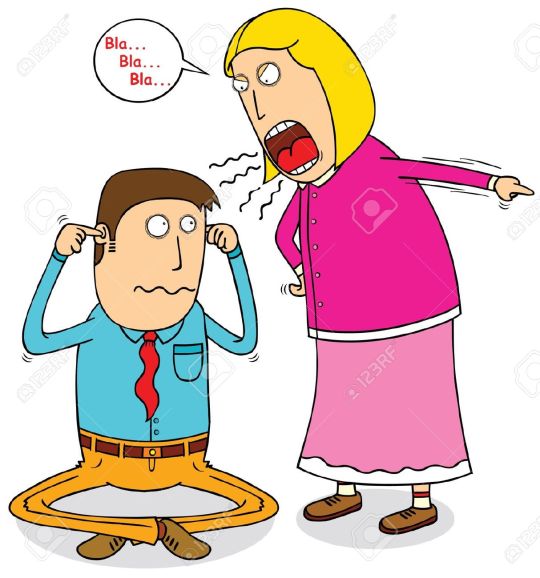
Image courtesy
What needs to be done to de-genderize anger and rage?
First, let us deal with ‘anger’ as it is and without attaching gender identity to it as perceived and propagated by patriarchy.
Let us all evolve, understand and deal with ‘anger’ as an aspect of the human psyche. It is a creation of ego and deep, turbulent emotion of negative nature. It has to be seen in the context of the civilized modern society we live in. Let us not surrender it to the alibi of primate trails still running in our blood. We need to acknowledge that shouting, cursing, beating or any type of verbal or physical abuse are the behavioral manifestations of anger – an internal state of mind indicating unresolved issues. It is never a sign of machismo, strength, maturity, or power. Rather, it exposes one’s vulnerability due to suppressed emotions such as despair, lack, fear, jealousy, false pride, insecurity, a sense of being less or inferior, an urge for superiority, dominance and control. It is a desperate call for attention and help, depression, and above all complete unawareness about one’s true self. Angry outbursts give one a false sense of power, camouflaging the fragility inside.
Be it an individual’s inner thoughts, emotions, belief systems or society’s collective accumulation of the same, anger must be freed from patriarchal genderization. Anger is extremely debilitating and damaging for both men and women. Every individual needs to be aware of the fact that anger is a phenomenon generating out of their internal mental state and their inability to deal with it. Nobody or nothing outside is responsible for their anger. Externalities function as triggers, often inadvertently or unintentionally. Every person must be held accountable for choosing how they would like to deal with such triggers that activate their own raw emotions, ego, psychological wounds and internal issues. They cannot use others as punching bags to hit out in frustration or as garbage bins to dispose of all the rubbish in their minds. Intensive self-awareness and emotional capacity building (EQ) training right from childhood through to adulthood would facilitate mindfulness in identifying anger in its core form and dealing with it without genderisation.
Secondly, women need 360-degree awareness to break free of male rage
Besides both men and women being trained in identifying anger as an emotion, what causes it, how it influences and shapes our behavior and actions, women also need to be made aware of what role they play in normalizing and legitimizing anger as a male trait. They have to recognize the situations, the psychology and cultural conditioning that make them subjugate their dignity, body autonomy, physical and mental well-being to male rage as a weapon of patriarchy. Once they are enlightened with this 360-degree awareness around the issue of male rage in patriarchy, they will have to stop endorsing it and become mentally and financially empowered to break free of this trap.
1 note
·
View note
Text
50 Shades Of The Invisibility Cloak
Five decades of my life have passed.
Today is my birthday, and I feel like a teenager again.
I have realised the 50s are the teenage of old age, especially for women.
I think most women feel the same.
I am neither in my youth nor in my old age.
While the youthful curves are gone, my face has not yet wrinkled enough or my body has not sagged or bent enough to earn the reverence of an old person.
Obviously, with this kind of body parameter, I do not fit into the optical radius of so-called ‘bird watchers’ anymore. Neither would anyone pay attention to the frailties gradually creeping into my system. I try to camouflage them with my smile and feminine demeanour and do not yet flaunt them.
In fact, whenever I step out on the street or visit any public place, I feel as if I am wearing an unseen cloak that makes me invisible to the world, like Harry Potter.
Not because I am ugly or unattractive but because I am no J’LO.
So, in their fifties, women neither evoke romantic admiration nor respectful compassion.
Does it make me feel sad?
Do I miss the male gaze?
Well, who doesn’t like admiring stares?
At the same time, it is liberating, too. Some ogling those days was not admiring but rather annoying. If today it feels as if I am wearing an unseen cloak that makes me invisible, back then, those types of stares made me feel as if I was not wearing any clothes at all.
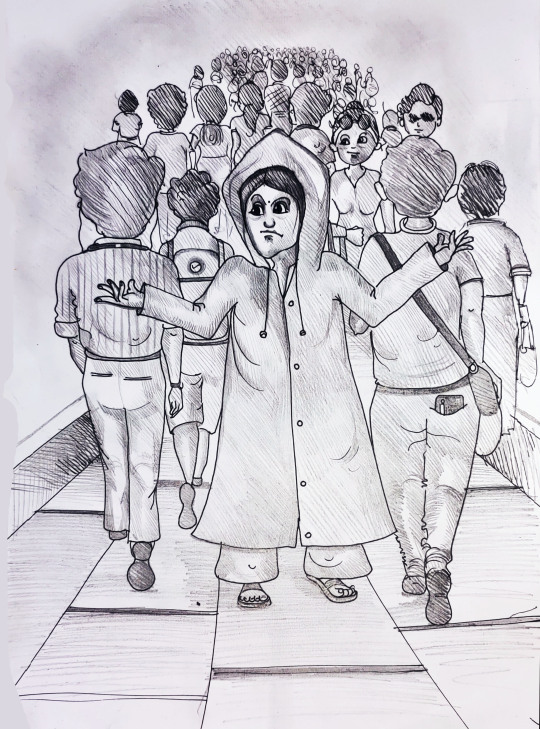
Illustration: Vidya Bhamre
No more of that botheration.
Now, I roam around in my magical cloak, invisible yet feeling beautiful inside. I don’t always need to worry about whether I look attractive enough to the world (read men).
Teenagers, too, go through this phase when their bodies are not
developed as young adults. They look raw and awkward, with early signs of puberty taking over their childish charm. They start feeling the rush of hormones and the thoughts they bring. They feel like adults and yearn to be treated like one. But they are rarely taken seriously or dealt with in adult-like respect.
They also stop getting the mollycoddling they used to get as small children. It gets replaced by constant heavy doses of ‘gyan’ for becoming a fine adult. Although adults themselves don’t want to grant them adulthood any soon. Parents of teenagers start feeling threatened by the reality of losing authority and control over their children at this stage. So, nobody, including parents, feels sympathy for their ordeal during this transitional phase. People are too judgmental and impatient about teenagers. Nobody sees the conflict between the retreating yet very much present child and the emerging yet immature adult in them. To make matters worse, people expect teenagers to behave both like a child and adults, whichever suits them at that point. Yet, no credit is conferred for being a sweet child or a good adult. In this tug of war, the teenager gets torn between his urge for adulthood and the resistance against being pushed back to the status of a child now and then.
This is a kind of no man’s land in life’s journey.
It’s the same story with women in their fifties.
They, too, go through hormonal turmoil in their bodies. An ebbing estrogen brings with it physical changes, often accompanied by psychological upheavals. But this condition is hardly understood by their near ones. Nobody understands their mood swings, emotional spells or undefined physical discomforts. By this time, their male partners had generally become very aloof. They prefer to remain in the safety bubble of their ‘me time’ and ‘me space’. I wish they had spared some effort to know what happens to a woman’s body at this age. They did it to unravel every mystery in and around younger female bodies. So, I neither get the revered status of a senior citizen nor the adoring attention I would in my younger avatar. Instead, I get loads of ‘gyan’ about how to look, think and behave like a soon-to-be old lady. No one understands that I am yet to flush out the residues of youth-like desires. I still want to dress up, party, travel or even go on a romantic date to catch up on some intimate moments with my partner. People, especially in some Indian society, judge fifty-plus women if they look and behave in a youthful manner. Anyways, a patriarchal society is ageist in its outlook. It measures a woman's worth in terms of her age. It prescribes a lifestyle for them accordingly and expects them to conform.
If women in their fifties complain about health problems, their family members will remind them that they are not yet that old to be sick. And if they want to enjoy themselves, wear colourful dresses, do some make-up, take up some work or go on adventure tourism, they are reminded that they are not younger anymore. So, I oscillate between the anxiety of moving forward to my sixties and my reluctance to let go of the youthful days of my late thirties and forties.

Illustration: Vidya Bhamre
At both ends, fifty-plus women, as teenagers, are at a losing game.
My mantra, hence, is to make the days of daydreaming of my teenage. Those days, my mind would reach out to catch the rainbow on the horizon, breaking the boundaries of time, place, people, and impossibilities.
My rainbow now has fifty shades of life.
I would expand it beyond the horizon of mortality.
0 notes
Text
The Lock Down Poems - A tête-à-tête with God (11)
Violation
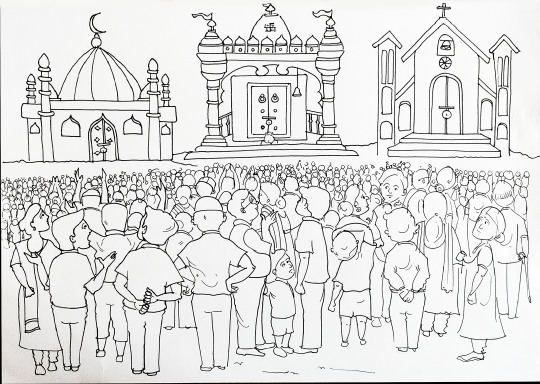
Illustration: Vidya Bhamre
You surpassed your limit,
And destroyed my most precious gift,
You encroached too far into Nature,
Too close for your safety and dignity,
Too close for your silly stature.
In your greed,
You are devouring the forests,
And polluting the air,
You are sucking out
Every drop of
Drinking water from the earth,
You are not even sparing
My other creations last.
Now, it’s your turn to evolve,
In mind, body and soul,
Retreat, reflect, do cleanse,
I have sent my soldier,
Covid19.

Illustration: Amit Shanklya
#SARSCoV2#COVID19#COVID19Crisis#COVID19Pandemic#worldfightscovid19#IndiafightsCovid19#Religion#spiritualism#spirituality#faith in God#faith#faith and belief#discrimination#pollution#climate change#karma#destiny#being human#human rights#environment#environment conservation#ecology#virus#corona virus#sustainable lifestyle#renewable energy
3 notes
·
View notes
Text
The Lock Down Poems - A tête-à-tête with God (10)
I let you try me
You stepped on my toes

Illustration: Vidya Bhamre
Everything you tried
To find me outside,
Your stamp-seals,
Your nameplates,
Your stories,
And your baits,
That inspire to kill,
You call it your zeal,
You spread the lie,
That it’s my appeal.
Everyday it’s a new fall
In my name,
Nothing but wall,
Like siblings build
On commonly inherited properties that yield.

Illustration:Amit
#Religion#religious fanatism#spirituality#God#faith in God#faith#belief#faith and belief#spiritualism#discrimination#superstition#consciousness#self-awareness
1 note
·
View note
Text
The Lock Down Poems - A tête-à-tête with God (9)
I played in your hand
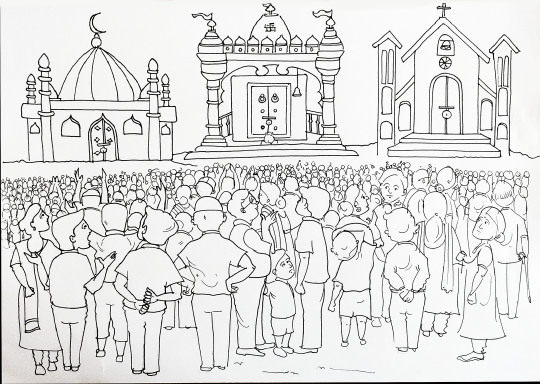
Illustration: Vidya Bhamre
Like a mother plays with her child,
I let you play with me,
I let you bathe, feed, dress me up
At home and in wild.
I let you touch and feel,
I let you heal,
By having me as your parent or friend,
As your lover, spouse or in your zen,
I let you mourn and celebrate,
My death, birth and wedding date
But the playful you,
Forget to view,
Scores of your fellow men and women,
Suffering a pain,
Everyday anew.
I wish you leave your doll’s house,
I wish you save and serve,
I wish your love and compassion douse,
The fire of hunger, disease and bruised nerve,
I wish, you keep your godly humane vows.
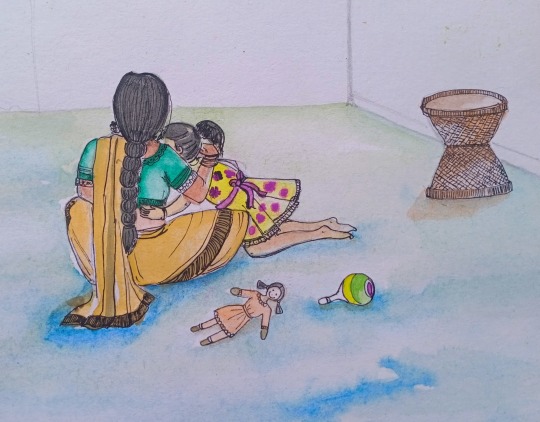
Illustration: Amit Shanklya
#God#faith#belief#faith and belief#spirituality#COVID19Pandemic#indiafightscovid19#spiritualism#spiritualjourney#self-awareness#consciousness
1 note
·
View note
Text
The Lock Down Poems - A tête-à-tête with God (8)
Number game in my name

Illustration: Vidya Bhamre
The count is on,
In your number game
I am the pawn.
The more you befool,
And make them drool,
In hope, in fear and ambition.
The game is to make more your tool,
It begets you might,
Thus, you lay on me your sole right,
And then,
It’s not me, it’s you who rule.

Illustration: Vidya Bhamre
0 notes
Text
The Lock Down Poems - A tête-à-tête with God (7)
Goddamn your God-stamp
Stop certifying who I am!

Illustration: Vidya Bhamre
You have made stamp-seals,
That you print on every newborn’s name,
Who is their God why you tell them?
Why you thrust books, hymns, rules and rituals?
Set them free, let them explore and dwell.
Don’t teach them to hate,
Those who have another stamp-seal or nameplate,
I am within one and all,
There is no bar,
There is no one big or small.
To look out for me,
Don’t make them walk afar.
Let them look within,
And not lose me in their mind and heart.

Illustration: Amit Shanklya
#Religion#spirituality#karma#faith#belief#COVID19Pandemic#COVID19Crisis#IndiafightsCovid19#WorldfightsCovid19#spiritualism#destiny#self-identity#self#identity#religious fanatism#fanatism#discrimination
0 notes
Text
The Lock Down Poems - A tete-a-tete with God (6)
Nature doesn’t lie, but humans do

Illustration: Vidya Bhamre
6
I despise
Those God’s abodes,
Where you trade the right to come close,
For believers exerting power, pelf, verbose,
Superseding the poor and meek,
Having no such grandiose.
I despise the places of prayer,
Where you preach hatred and dare,
The place that is no less a snare,
Of superstition and unverifiable share,
About who am I and what I declare.
For your God’s sake,
Don’t look for me here,
I am not there.
I am not there.

Painting: Moushumi Chakravorti
#faith#faith and belief#religion#spirituality#karma#superstition#discrimination#COVID19Pandemic#SARSCoV2#indiafightscovid19#WorldfightsCovid19
2 notes
·
View notes
Text
The Lock Down Poems - A tête-à-tête with God (4&5)
Is it your love for me or a paradox?
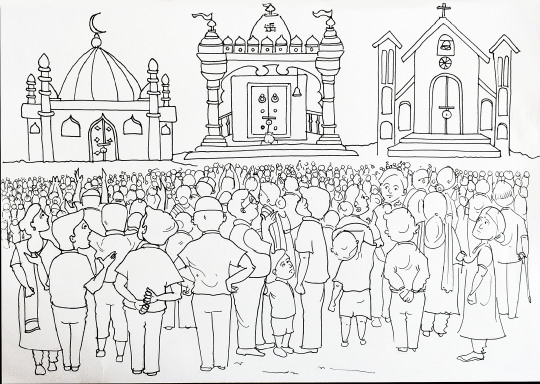
Illustration: Vidya Bhamre
4
I know you shower me with all the goodies and blood
That your money can buy,
And weapons can flood.
I know you made beautiful places to come and pray,
But then,
You have still gone astray.
Well, you do appease me,
But what about those?
Whom you bar?
From your god-fearing world?
Into dungeon of poverty,
And bruise and scar?
Only because,
You think they are unworthy and not at par?
What about those babies and children?
Living only in their skin and bones?
What about those old and sick?
With no care, respect and support shown?
What about those billions of people?
Having no access to education, healthcare or home?
Yet, and yet you vouch your love for me?
While creating so much despair and gloom?

Illustration: Vidya Bhamre
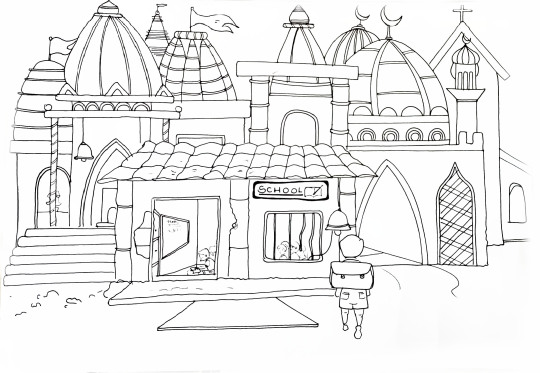
Illutration: Vidya Bhamre
5
It puts me to shame.
How could you neglect something so grave?
In a country of 1.3 billion,
You have made temples 2 million and
Mosques three to four hundred thousand,
But not even hundred thousand hospital and healthcare,
To withstand diseases and ailments?
And to serve enough patients?
Not enough good colleges and schools either,
Five hundred some medical colleges meager,
Is it just?
Is it fair?
Oh no…
I need none of your home, offerings and prayer,
Spare me from your fight to give me name and fame.

Illustration: Vidya Bhamre
#faith and belief#religion#God#Covid19#SARSCoV2#WorldfightsCovid19#IndiafightsCovid19#faith in god#faith#spirituality#karma#belief
0 notes
Text
The Lock Down Poems - A tête-à-tête with God (3)
I don’t need no abodes made by you – I am within you
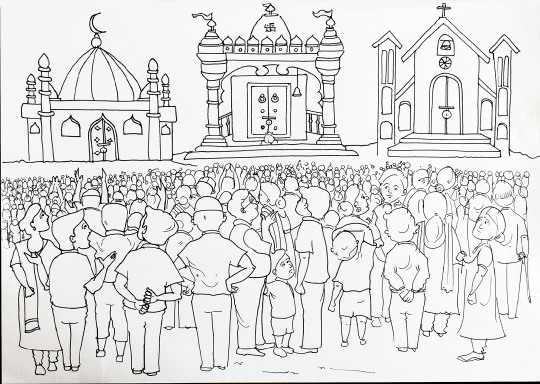
Illustration: Vidya Bhamre
3
Don’t look for me here,
In the abodes you made so lovingly for me.
I know you like to believe
Here I exist in approachable proximity,
You think I would be able to hear your prayers
Sooner, louder and faster
And to reach out to me,
It won’t take millions of light years.
Why do you need to make separate homes for my stay?
Why do you need places to come and pray?
When was I someone, so far away?
I can hear even the words you do not say.
Look within, I am there in you,
That is the nearest I could be
And it’s nothing new.
I can hear your unvoiced thoughts,
Each of your heartbeat and all your spoken words.
So why you worry,
Say your prayers,
From wherever you are.
No loudspeakers, no amplifiers,
I can still hear you,
Coz I am within you.
You are my temple,
you are my mosque,
you are my church,
Can you hear my knock?
Within your heart?
Knock knock,
Knock knock,
Can you hear me?
Please open the lock.
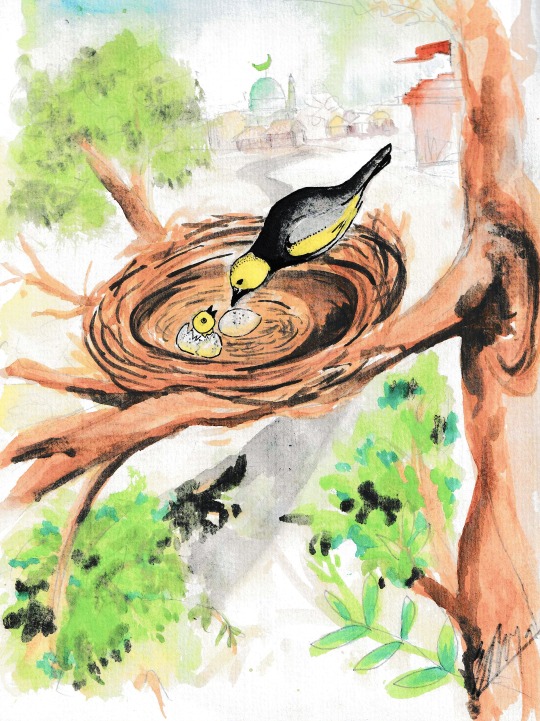
Illustration: Amit Shanklya
#WorldfightsCovid19#IndiafightsCovid19#Covid19#Covid19pandemic#pandemic2020#coronavirus#sarscov2#faith#God#destiny#karma#Religion#spirituality#superstition
0 notes
Text
The Lock Down Poems - A tête-à-tête with God (1 & 2)
The v-I-r-us
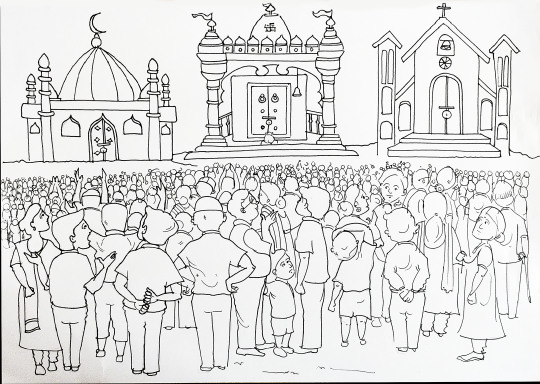
Illustration: Vidya Bhamre
1
The world is shutting down,
All that we were so proud of
Now out of bounds.
We are in a lock down.
It hasn’t even spared God’s abodes,
Even God is in quarantine.
The premises of prayer,
Not safe to surrender.
The priests too,
Do not have any conferred power,
To save the believers.
Our touch is today so contagious,
It dismisses even God’s blessings on us!

Illustration: Amit Shanklya
2
Sars cov 2
Doesn’t care who are you,
It has no religion, race or class,
It has come to teach us,
A lesson en mass..
It’s a messenger from behind the closed doors
Of temples, churches and mosques,
And the closed doors of our hearts.
Let’s calm down and listen to those words
With humility,
And lowering all the swords,
No more pride,
And please, blind faith no more.
#god#faith#Covid19#religion#worldfightscovid19#indiafightscovid19#Coronavirus#covid19crisis#prayer#spirituality#spiritualism#karma#belief#destiny#consciousness#self-awareness#religious fanaticism
0 notes
Text
Quarantine Story - An Antidote

“Doctor saab, doctor saab!” Someone was calling from outside.
The doctor was sleeping on a rickety couch. It was the 9th day of his quarantine. He rubbed his eyes and picked up his steel banded wristwatch kept beside his pillow. It was 6 in the morning. The soft sunbeams were entering from the half open wooden window. He could see lot of dust particles floating in the air.
“Who was calling me? Or was I dreaming?” he thought sleepily.
He looked around the room from inside the mosquito net. He remembered the first day when he unlocked the rusted lock and opened the creaky door of this room. A musty smell hit his nose hard. The paint and plaster on the walls were peeling off in many places. Thick cobwebs were hanging in almost all the corners. Layers of dust, droppings of insects and lizards covered the floor. In some places, mites had built their nests.
The apartment, allotted to one of the staff doctors of the hospital, was vacant for quite a long time. He had his own house in the city, much better than this staff quarter of the government hospital. Every day he traveled to the hospital from his own home. The doctor had to get the keys of this flat from one of the neighbors to use it for his quarantine.
The mobile phone started ringing. It was cousin Amulya.
“Good morning brother. I got to know you have been staying in quarantine. What happened?” he asked.
“It’s all because of that irresponsible idiot, you know. He came to see me with all the symptoms of covid-19,” the doctor came out of the mosquito net while speaking on the phone. “I don’t understand how such well-to-do, educated people can be so callous and irresponsible. He didn’t inform the clinic before arriving and waited with other patients. After the check-up, when I asked him to go for isolation and tests, I could already sense his reluctance. Later I came to know he had gone into hiding. He was a medical student studying abroad. How could he be so negligent?" the doctor narrated agitatedly while going towards the washroom.
"I know. Such people not only risk their own lives, they also cause risk to others," the cousin brother adds.
"There are few doctors in the hospital now, you know. Most of them stay in the city. They are either not able to or willing to come and attend their duties. I am the only one who stays here and now I am also stuck. Who will see the patients in the hospital, tell me?" the doctor shares his concern.
Eight days ago, the doctor had called his mother in the afternoon.
“Maa, I am going to stay here, at Dr Sinha’s flat on the ground floor. Namita will tell you the whole story. Don’t worry. This is only a precaution. I will be fine,” the doctor assured his 82-year old mother. She suffers from anxiety and paranoia.
“I needed to tell her the truth. No point in hiding. Eventually, she will feel assured knowing I am in the same building and doing fine,” the doctor thought after speaking to her.
His mother broke into tears. “I told you not to go to the clinic. Why didn’t you listen to me? You are no more a young guy. You are almost 60, about to retire shortly. Now if you get the virus, what will happen?”
“Maa, I understand your worry. Even I am worried. It is most likely nothing will happen to me. That is why taking precaution,” he tried to explain to his mother.
The old lady continued ranting. But there was not much time to listen to her or engage in the conversation. The doctor needed to make arrangements for staying in the room. He had asked the sweepers to come and clean it.
Damodar, the head sweeper, came with his twenty something son Srihari almost immediately. Damodar had retired recently. Both father and son got down to work.
After giving them instructions, the doctor called his mother back.
“There is no furniture in that flat. Are you going to sleep on the floor? I am afraid you will anyway fall sick if you stay there,” she complains.
“I will not sleep on the floor Maa. Don’t worry. I am making some arrangement. Damodar and Srihari are cleaning the room for me. You take care of yourself. I will see you after 14 days’ quarantine. Okay?" the doctor said.
"Listen Maa, Corona wants me to go for a 14 day-exile like queen Kaikeyee wanted Rama to go for 14 years’ exile to the forest. But Rama defeated Ravana. Right? I will also defeat Corona. I won’t let it get to me," the doctor tried to be humorous. He thought it would divert his mother’s mind and assuage her anxiety.
“Doctor saab, doctor saab.”
The doctor was brushing his teeth when he heard him.
“Someone is calling me. Who is this? No one comes near my room in fear of catching the infection. Neighbors do not even respond if I try to talk to them from the window. Hope everything is fine. It sounds like Srihari, the head sweeper’s son,” the doctor washed his face and walked back to the room.
Srihari was standing outside the window.
“What happened, Srihari? Is everything okay?” the doctor asked while wiping his face with a towel.
“Yes, doctor saab. Everybody is okay. How are you doing, doctor saab?” asked Srihari, with real concern on his face. He was a primary school drop-out. Being Damodar’s eldest son, he had to join his poor father in helping him quite early in life.
“I am okay Srihari. Thank you for asking,” the doctor said in a relaxed tone.
“Keep this with you doctor saab. It must be very difficult for you to stay in this room. Isn't it? No AC, no proper bed. My grandmother says these leaves purify the air. Very healing,” Srihari extended a bunch of twigs with fresh, green Neem leaves on it.

Illustration: Vidya Bhamre
The doctor was amazed by the genuine concern and thoughtfulness of this youth. Such a gesture is usually least expected from the likes of him. Society looks at them as illiterate, uneducated and lower class.
“What a contrast between an educated youth and him. They must be of the same age,” the Doctor thought.
Tears welled up in his eyes. He felt ashamed and guilty. He felt so grateful too.
“What happened doctor saab? Take this.” He pointed towards the bunch of Neem leaves he had kept on the windowsill.
“I know you are a doctor. You give medicines. But our mother nature is also a good doctor, you know. She has a cure for everything. We have to trust her,” said Srihari with the wisdom of a sage, yet a childlike smile on his face.
The doctor picked up the bunch. He could hardly utter the words “Thank you.” They got drowned by the surge of emotions in his heart.
Srihari looked relieved and grinned.
“Don’t worry doctor saab. You will be fine and will come out soon of this room. Whenever you need me to clean your room, just let me know. I will come and clean it. Take care doctor saab,” - Srihari disappeared from the window.
#Quarantine#Corona#covid 19#corona virus#sarscov2#neem#medicine#corona medicine#death#hope#humanmind#kindness#economicclass#behavioural science#psychology#mentalhealth#anxiety#depression#healing
2 notes
·
View notes